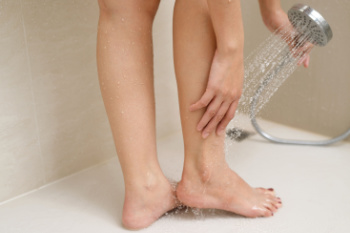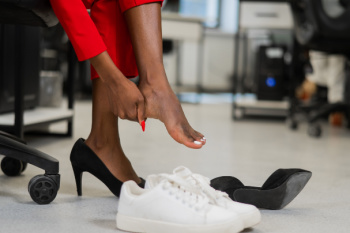Connect With Us
Blog
Items filtered by date: May 2024
Simple Daily Care Tips to Nurture Your Feet

Everyday foot care is essential for keeping your feet healthy, comfortable, and free from common issues like dryness, odor, and rough skin. Begin by washing your feet daily with warm water and a gentle soap to remove dirt and bacteria. After washing, take a few minutes to exfoliate your feet using a pumice stone or foot scrub to slough off dead skin cells and promote smoothness. Follow up by moisturizing your feet with nourishing foot cream or lotion, paying special attention to areas prone to dryness like heels and soles. For an extra treat, indulge in a foot soak once or twice a week, adding Epsom salts or essential oils to warm water to soothe tired feet and soften rough skin. Finally, dusting your feet with a foot powder can help absorb moisture, reduce friction, and keep your feet feeling fresh throughout the day. If you have a foot condition and need help, it is suggested that you confer with a podiatrist.
Everyday foot care is very important to prevent infection and other foot ailments. If you need your feet checked, contact one of our podiatrists from Lexington Foot and Ankle Center, PSC. Our doctors can provide the care you need to keep you pain-free and on your feet.
Everyday Foot Care
Often, people take care of their bodies, face and hair more so than they do for their feet. But the feet are a very important aspect of our bodies, and one that we should pay more attention to. Without our feet, we would not be able to perform most daily tasks.
It is best to check your feet regularly to make sure there are no new bruises or cuts that you may not have noticed before. For dry feet, moisturizer can easily be a remedy and can be applied as often as necessary to the affected areas. Wearing shoes that fit well can also help you maintain good foot health, as well as making it easier to walk and do daily activities without the stress or pain of ill-fitting shoes, high heels, or even flip flops. Wearing clean socks with closed shoes is important to ensure that sweat and bacteria do not accumulate within the shoe. Clean socks help to prevent Athlete’s foot, fungi problems, bad odors, and can absorb sweat.
If you have any questions please feel free to contact our offices located in Harrodsburg, Frankfort, Georgetown, and Lexington, KY . We offer the newest diagnostic and treatment technologies for all your foot and ankle needs.
Common Symptoms of Plantar Fasciitis
 Plantar fasciitis occurs when the thick band of tissue that runs along the bottom of your foot, called the plantar fascia, becomes inflamed. Plantar fasciitis is a common cause of heel pain. It is characterized primarily by a sharp, stabbing pain in the bottom of the foot near the heel. This pain is often more pronounced in the morning when taking the first steps of the day, or after long periods of sitting or standing. The pain may flare up with intense activity but typically worsens after, not during, the exercise. Other symptoms include swelling and tenderness in the heel area. Plantar fasciitis is particularly prevalent in runners, overweight individuals, and those whose jobs require long hours on their feet. Wearing shoes with inadequate support exacerbates the problem in those with plantar fasciitis. Effective treatment involves rest, stretching exercises, and proper footwear. If you have heel pain and suspect plantar fasciitis, it is suggested that you consult with a podiatrist, or foot doctor, for care.
Plantar fasciitis occurs when the thick band of tissue that runs along the bottom of your foot, called the plantar fascia, becomes inflamed. Plantar fasciitis is a common cause of heel pain. It is characterized primarily by a sharp, stabbing pain in the bottom of the foot near the heel. This pain is often more pronounced in the morning when taking the first steps of the day, or after long periods of sitting or standing. The pain may flare up with intense activity but typically worsens after, not during, the exercise. Other symptoms include swelling and tenderness in the heel area. Plantar fasciitis is particularly prevalent in runners, overweight individuals, and those whose jobs require long hours on their feet. Wearing shoes with inadequate support exacerbates the problem in those with plantar fasciitis. Effective treatment involves rest, stretching exercises, and proper footwear. If you have heel pain and suspect plantar fasciitis, it is suggested that you consult with a podiatrist, or foot doctor, for care.
Plantar fasciitis is a common foot condition that is often caused by a strain injury. If you are experiencing heel pain or symptoms of plantar fasciitis, contact one of our podiatrists from Lexington Foot and Ankle Center, PSC. Our doctors can provide the care you need to keep you pain-free and on your feet.
What Is Plantar Fasciitis?
Plantar fasciitis is one of the most common causes of heel pain. The plantar fascia is a ligament that connects your heel to the front of your foot. When this ligament becomes inflamed, plantar fasciitis is the result. If you have plantar fasciitis you will have a stabbing pain that usually occurs with your first steps in the morning. As the day progresses and you walk around more, this pain will start to disappear, but it will return after long periods of standing or sitting.
What Causes Plantar Fasciitis?
- Excessive running
- Having high arches in your feet
- Other foot issues such as flat feet
- Pregnancy (due to the sudden weight gain)
- Being on your feet very often
There are some risk factors that may make you more likely to develop plantar fasciitis compared to others. The condition most commonly affects adults between the ages of 40 and 60. It also tends to affect people who are obese because the extra pounds result in extra stress being placed on the plantar fascia.
Prevention
- Take good care of your feet – Wear shoes that have good arch support and heel cushioning.
- Maintain a healthy weight
- If you are a runner, alternate running with other sports that won’t cause heel pain
There are a variety of treatment options available for plantar fasciitis along with the pain that accompanies it. Additionally, physical therapy is a very important component in the treatment process. It is important that you meet with your podiatrist to determine which treatment option is best for you.
If you have any questions, please feel free to contact our offices located in Harrodsburg, Frankfort, Georgetown, and Lexington, KY . We offer the newest diagnostic and treatment technologies for all your foot care needs.
Foot Injuries in Child Athletes

Foot injuries among child athletes are a common occurrence, often stemming from the high level of physical activity and the rapid growth and development of their bodies. These injuries can vary in severity and type, but some are more prevalent than others. One common foot injury is a stress fracture, which occurs when repetitive stress on the bones leads to tiny cracks. Another frequent injury is ankle sprains, where the ligaments supporting the ankle are stretched or torn due to sudden twisting motions. Additionally, conditions like Sever's disease, characterized by inflammation of the growth plate in the heel, and plantar fasciitis, involving inflammation of the tissue connecting the heel bone to the toes, are not uncommon. Proper warm-up, stretching, and wearing appropriate footwear can help prevent these injuries. If your child has endured a foot injury, it is strongly suggested that prompt attention be sought from a podiatrist who can offer appropriate treatment solutions.
Making sure that your children maintain good foot health is very important as they grow. If you have any questions, contact one of our podiatrists of Lexington Foot and Ankle Center, PSC. Our doctors can provide the care you need to keep you pain-free and on your feet.
Keeping Children's Feet Healthy
Having healthy feet during childhood can help prevent medical problems later in life, namely in the back and legs. As children grow, their feet require different types of care. Here are some things to consider...
Although babies do not walk yet, it is still very important to take care of their feet.
Avoid putting tight shoes or socks on his or her feet.
Allow the baby to stretch and kick his or her feet to feel comfortable.
As a toddler, kids are now on the move and begin to develop differently. At this age, toddlers are getting a feel for walking, so don’t be alarmed if your toddler is unsteady or ‘walks funny’.
As your child gets older, it is important to teach them how to take care of their feet.
Show them proper hygiene to prevent infections such as fungus.
Be watchful for any pain or injury.
Have all injuries checked by a doctor as soon as possible.
Comfortable, protective shoes should always be worn, especially at play.
If you have any questions please feel free to contact our offices located in Harrodsburg, Frankfort, Georgetown, and Lexington, KY . We offer the newest diagnostic and treatment technologies for all your foot and ankle needs.
Arthritis Can Cause Pain in the Feet and Ankles
What is Peroneal Tendonitis?

Peroneal tendonitis is inflammation of the peroneal tendons along the outside of the ankle, often due to overuse or sudden increases in activity. Athletes, particularly runners and dancers, are prone to this condition. Symptoms include pain, swelling, and tenderness along the outside of the ankle, especially during physical activity. Diagnosis involves a physical exam, imaging tests, and assessment of medical history. Treatment includes rest, anti-inflammatory medications, and exercises to strengthen muscles and improve flexibility. In severe cases, immobilization or corticosteroid injections may be necessary. A podiatrist can provide expert diagnosis and treatment, offering personalized rehabilitation strategies to alleviate symptoms and prevent the recurrence of peroneal tendonitis. If you have pain on the outside of your ankle, it is suggested that you contact a podiatrist for care.
Foot and ankle trauma is common among athletes and the elderly. If you have concerns that you may have experienced trauma to the foot and ankle, consult with one of our podiatrists from Lexington Foot and Ankle Center, PSC. Our doctors will assess your condition and provide you with quality foot and ankle treatment.
Foot and ankle trauma cover a range of injuries all over the foot; common injuries include:
- Broken bones
- Muscle strains
- Injuries to the tendons and ligaments
- Stress fractures
Symptoms
Symptoms of foot and ankle injuries vary depending on the injury, but more common ones include:
- Bruising
- Inflammation/ Swelling
- Pain
Diagnosis
To properly diagnose the exact type of injury, podiatrists will conduct a number of different tests. Some of these include sensation and visual tests, X-rays, and MRIs. Medical and family histories will also be taken into account.
Treatment
Once the injury has been diagnosed, the podiatrist can than offer the best treatment options for you. In less severe cases, rest and keeping pressure off the foot may be all that’s necessary. Orthotics, such as a specially made shoes, or immobilization devices, like splints or casts, may be deemed necessary. Finally, if the injury is severe enough, surgery may be necessary.
If you have any questions, please feel free to contact our offices located in Harrodsburg, Frankfort, Georgetown, and Lexington, KY . We offer the newest diagnostic and treatment technologies for all your foot care needs.
